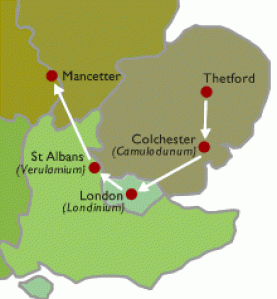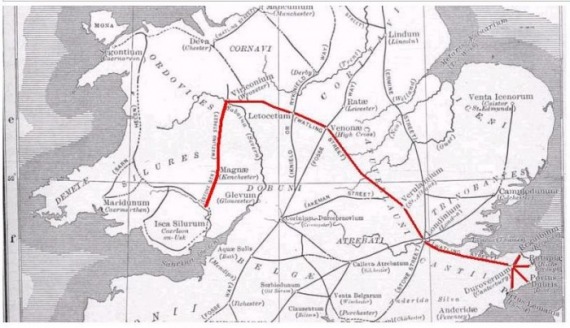Taking on an Empire: Queen Boudicca
Boudicca's Campaign
Boudicca's raised her army in modern day Thetford, where the Iceni tribe was located. She then marched her army to Colchester (near Chelmsford), where she fought the Roman legions. Boudicca then led her rebellion to Londinium (London), and her and her army burnt the city to the ground, chasing General Gaius Suetonius Paulinius' army away. She boldly moved on to Verulamium (modern day St. Albans), where another brutal sacking took place. General Suetonius, meanwhile, regrouped his forces in the West Midlands, Then marched on to Watling street, in Mancetter, where his troupes were incredibly outnumbered, and the decisive battle would take place.
The Battle of Watling Street
The Romans, wearing state of the art armor and handling weapons the Britains had never seen before, marched onto the battlefield. Even with armor and weapons for every soldier, the Romans were at a great disadvantage. They were greatly outnumbered. General Suetonius' greatest fear was that he would be tremendously overwhelmed by a storm of savage Britains. Boudicca's army consisted of at least four to five times that of Suetonius' army. As Boudicca's army maneuvers into position, the Britains stretched out for as long as the eye could see. Even if the Romans lined up in a single file line along the battlefield, they would still not reach as long as Boudicca's front line. Boudicca, at the head of an army of about 230,000 rode in the chariot herself, leading the army as their queen. Her army, clad in face paint, were shouting savagely in an effort to intimidate the Romans. They knew that the Romans were terrified by barbarian chaos, and Suetonius knew that this battle was all or nothing. It was not a possibilty to march back to Rome, undefeated.
Boudicca's army charged at the motionless Roman legions. They waited until the Britains were close enough to discharge their first attack. When they had come close enough, the Romans let loose 7,000 flying javelins that hit the savage tribesmen. The Britains were armor less, so the javelins were very effective in killing. Even if they had hit the shields of the Britains, their shields were now useless. They threw the shields away, and instantly they are defenseless. Astounded at the surprise attack, the first attack fell back. Thousands of Britains lie dead on the battlefield within minutes of fighting.
A second wave of Celtic warriors lined up to have a go at their Roman enemies. They are met with a wall of shields held by the strong Roman legions. This wall is a specialty of the Romans, and they are rarely ever defeated when they use this tactic. The Britains, with their long swords, would try to get to the Romans, who would respond by stabbing them in the abdomen and yanking upwards with a short sword. the carnage resulting from this method was of course immense. The Britains valiantly pushed forward despite this.
The Romans would continuously rotate their front line so a soldier only had to fight every forty minutes. Britain's style of combat proved no match for the unrelenting Romans. After the Celtic army was visibly smaller and much weaker, the Romans took the initiative and broke up to defeat the Celts faster. They moved forward, decimating all in their way. They got into a formation called wedge formation and pushed forward. This tactic put the full weight of the Romans onto the Celtic forces. They pushed back the Britains into the wagon train behind them. Then the Romans started mercilessly killing everyone. Not even women were spared in this slaughtering. Soon the Celts had officially lost a battle that they were confident that they were going to win.
"Boudicca, in a [chariot], with her two daughters before her, drove through the ranks. She harangued the different nations in their turn: "This," she said, "is not the first time that the Britons have been led to battle by a woman. But now she did not come to boast the pride of a long line of ancestry, nor even to recover her kingdom and the plundered wealth of her family. She took the field, like the meanest among them, to assert the cause of public liberty, and to seek revenge for her body seamed with ignominious stripes, and her two daughters infamously ravished. From the pride and arrogance of the Romans nothing is sacred; all are subject to violation; the old endure the scourge, and the virgins are deflowered. But the vindictive gods are now at hand. A Roman legion dared to face the warlike Britons: with their lives they paid for their rashness; those who survived the carnage of that day, lie poorly hid behind their entrenchments, meditating nothing but how to save themselves by an ignominious flight. From the din of preparation, and the shouts of the British army, the Romans, even now, shrink back with terror. What will be their case when the assault begins? Look round, and view your numbers. Behold the proud display of warlike spirits, and consider the motives for which we draw the avenging sword. On this spot we must either conquer, or die with glory. There is no alternative. Though a woman, my resolution is fixed: the men, if they please, may survive with infamy, and live in bondage.'" from The Annals of Tacitus (AD 110-120), Book XIV


